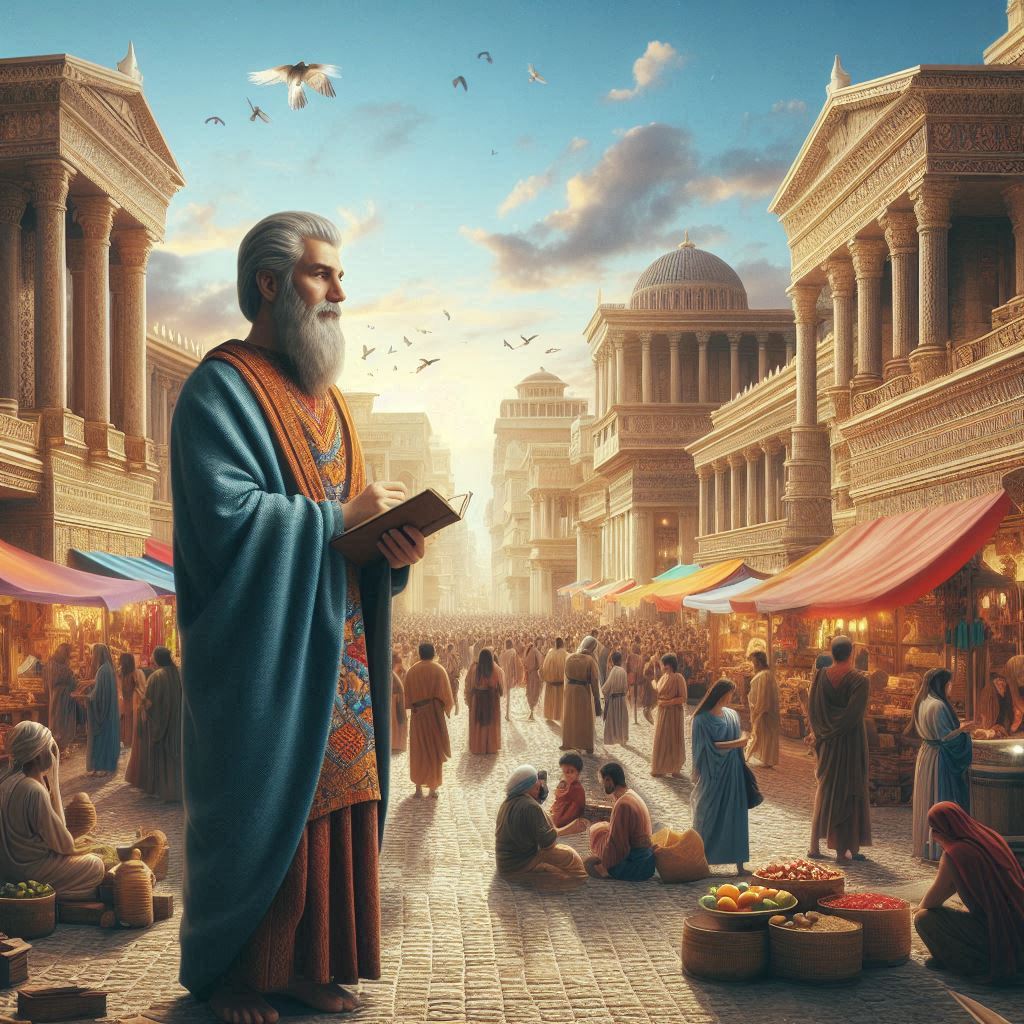Who was Daniel, the prophet and counselor in Babylon? This is a question that reveals not only an impressive biblical figure, but also a story of faith, courage and wisdom in the midst of exile. Daniel was a young Jew of noble origin, taken captive to Babylon during the reign of King Nebuchadnezzar.
Even in a foreign land, he stood out for his intelligence, firmness of character and devotion to God, gaining prestigious positions within the Babylonian court. Recognized as a prophet, Daniel interpreted dreams and visions with divine precision, and became an eternal example of integrity and spiritual perseverance. His journey is one of the most inspiring stories in the Bible, especially in the book that bears his name.
The Babylonian captivity: how it all began
The exile of the people of Israel and the emergence of Daniel
The backdrop to Daniel’s story is the Babylonian captivity, one of the darkest periods in Israel’s history. In the year 605 BC, the Babylonian Empire, under the command of Nebuchadnezzar, invaded Jerusalem and took many young Israelites captive. Among them was Daniel, who, although still very young, was already showing wisdom and fear of God. The choice of the best among the captives – healthy, intelligent and well-educated young men – was intended to form a new elite that would serve the empire.
Daniel’s training at Nebuchadnezzar’s court
Daniel, along with his friends Hananiah, Mishael and Azariah (better known as Shadrach, Meshach and Abednego), went through a process of acculturation. They were given new Babylonian names and trained in the customs and language of Babylon. However, Daniel firmly decided not to contaminate himself with the king’s unclean food, and this act of fidelity made him stand out from the start. His spiritual steadfastness and intelligence caught the attention of the rulers, and he soon came to occupy positions of trust.
Daniel, counselor to kings and interpreter of dreams
Daniel’s divine wisdom and political role
Daniel’s work as a royal advisor was marked by episodes that defied human logic. One of the most remarkable moments occurred when he interpreted a dream of King Nebuchadnezzar that no one else could decipher. This event further elevated his position at court, and Daniel came to be consulted on important decisions in the kingdom. Later, he also served under the Medes and Persians, demonstrating his relevance as a political and spiritual figure in multiple reigns.
Daniel’s faithfulness in the face of danger
Another remarkable episode was his faithfulness to prayer, even when he was forbidden to worship God. Daniel prayed three times a day, and this practice led to the famous story of the lions’ den. Accused by his enemies, he was thrown to the lions, but survived unharmed thanks to divine intervention. This miracle not only confirmed his faith, but also had an impact on King Darius himself, who recognized the power of Daniel’s God. This event further strengthened his role as a spiritual and moral reference at court.
Daniel’s prophetic visions and spiritual legacy
Prophecies about kingdoms and the end times
The book of Daniel contains complex and significant prophetic visions, some of which are fundamental to an understanding of biblical eschatology. These include the famous vision of the four beasts and the seventy weeks, which speak of the rise and fall of kingdoms, the coming of the Messiah and the events of the end times. These deeply symbolic revelations have been interpreted over the centuries as divine messages about the future of humanity.
Daniel’s influence on Christian theology and faith
Daniel was not only a prophet of the past, but a visionary whose spiritual impact spans the centuries. His story is an invitation to unwavering faithfulness, even in the face of the greatest pressures. He represents an archetype of the believer who stands firm, even in hostile and corrupt environments. Theologians, scholars and Christian leaders continue to study his writings, recognizing in him a prophetic voice pointing to God’s eternal kingdom.
Timeless lessons: why Daniel still inspires so many people
Courage, faith and wisdom applied to life today
Daniel’s life teaches us that it is possible to live with integrity even in systems that challenge our values. His courage in confronting unjust kings and decrees, his steadfast faith and his wisdom in dealing with political and spiritual challenges serve as an example for those who wish to live relevantly and with integrity in today’s world. He reminds us that true authority comes from God, and that faithfulness to Him bears eternal fruit.
A model of influence with purpose
Daniel showed that it is possible to influence the powerful without becoming corrupted, to serve with excellence without losing one’s spiritual identity and to lead with discernment even in times of crisis. His story challenges us to seek wisdom, to keep prayer a priority and to trust that God can use us greatly, even in the most adverse situations.
The Historical Context of the Babylonian Captivity
The fall of Jerusalem and the beginning of the exile
The Babylonian captivity marked one of the most traumatic periods in Israel’s history. In the year 605 BC, during the rise of the Babylonian Empire under Nebuchadnezzar II, Jerusalem was invaded and sacked. The Jewish elite, including noble and educated young men, were forcibly taken to Babylon. Among these young men was Daniel, who would later become one of the court’s chief advisors. This episode not only represented the loss of Judah’s political autonomy, but also a test of faith for many Jews who were exposed to a pagan and oppressive culture.
The spiritual and social situation of the Jewish people
Before the exile, the people of Israel lived through a period of spiritual decadence, disobedience and idolatry. Several prophets, such as Jeremiah, had warned of the consequences of this unfaithfulness. The exile was partly a divine judgment, but also an opportunity for repentance and the renewal of the covenant with God. Daniel emerges in this scenario as an example of a faithful young man who, even far from his homeland, remained upright, obedient to God’s Law and firm in his spiritual identity.
How Daniel ended up in the Babylonian court
Daniel was taken to Babylon at a young age, probably around 15. Because he came from a noble family and showed wisdom and an ability to learn, he was selected to serve in the royal palace. Nebuchadnezzar ordered that he, along with other young Jews, be trained in the language and culture of the Chaldeans. The intention was to mold them according to Babylonian standards, but Daniel, despite being given the Babylonian name Belteshazzar, remained faithful to Jewish principles, making him a rare example of loyalty in the midst of cultural assimilation.
Babylon’s political and religious environment
Babylon was a powerful metropolis, known for its majestic architecture, scientific advances and structured political system. It was also a center of idolatry and occult practices. The pressure on the Jews to assimilate these traditions was immense. Daniel, however, resisted these influences. Even in an environment full of pagan gods, soothsayers and astrologers, he stood out for his connection with the God of Israel. His story shows how it is possible to live with faith and purpose even in the face of an empire hostile to divine truth.
Who was Daniel, the prophet and counselor in Babylon?
Who was Daniel, the prophet and counselor in Babylon? Daniel was a young Hebrew of noble lineage, born in Jerusalem, who distinguished himself during the Babylonian exile. From an early age, he showed extraordinary qualities of wisdom, spiritual discernment and deep fidelity to the God of Israel. His story is recorded in the book of Daniel, where he reveals himself not only as a prophet, but also as an influential advisor in the kingdoms of Babylon and Persia, remaining faithful even in the face of great pressure and threats.
During the first deportation of the Jews to Babylon, King Nebuchadnezzar ordered that the most promising young men from Israel’s elite be selected to be trained in the culture, language and science of the Chaldeans. Daniel was one of those chosen. Even though he was forced to live in a pagan culture, he stood out for not giving up his faith, refusing to defile himself with the king’s food and maintaining a life of constant prayer. This attitude caught the attention of the officials and put him in a prominent position.
Daniel’s qualities went beyond his intelligence and appearance. He was described as wise, prudent, full of insight and with an excellent spirit. His ability to interpret dreams and supernatural visions made him a key player in the royal court. On several occasions, he revealed mysteries that not even the magicians and soothsayers of Babylon could understand, always making it clear that his wisdom came from God and not from human merit. His integrity was so solid that not even his enemies could find fault with his conduct.
The name “Daniel” means “God is my judge”, and carries with it the essence of his mission. Even when his name was changed to Belteshazzar in Babylon, he did not allow his spiritual identity to be corrupted. The meaning of his name reflects his attitude to life: living before God, trusting in divine justice and remaining blameless even in the midst of the empire’s corruption. Daniel is remembered to this day as an example of loyalty, courage and wisdom in times of trial.
Daniel at the Babylonian Court – From Captive to Counselor

Who was Daniel, the prophet and counselor in Babylon? He was a young Hebrew taken captive during Judah’s exile who, even far from his homeland, became one of the greatest names in biblical history by serving as an advisor to pagan kings and a prophet of powerful revelations. His impressive career began in his youth, when he was chosen to serve in Nebuchadnezzar’s palace for his exceptional wisdom, appearance and intelligence. But it was his faithfulness to God that really made him stand out in the Babylonian court.
One of the most emblematic moments of Daniel’s rise was when he interpreted King Nebuchadnezzar’s dream – a dream that none of the empire’s magicians or wise men were able to reveal. Through prayer and total dependence on God, Daniel was able to describe and interpret the dream of the great statue made of different metals, representing the empires to come. This revelation not only saved the lives of the Babylonian wise men, but also led to Daniel’s promotion to governor of the province and chief of the king’s wise men.
The faithfulness of Daniel and his friends – Shadrach, Meshach and Abednego – was even more evident when they refused to worship the golden statue erected by Nebuchadnezzar. Because of this, the three were thrown into a fiery furnace, but miraculously survived, walking into the fire in the presence of a heavenly being. This episode consolidated the king’s respect for the Jews and showed the power of the God of Israel in the middle of enemy territory.
Years later, under Persian rule, Daniel faced a conspiracy hatched by jealous people who wanted to remove him from power. Knowing of his daily devotion, they created a law that forbade praying to any god other than the king. Daniel, firm in his faith, continued to pray and was thrown into the den of lions. God miraculously delivered him, and King Darius publicly acknowledged the sovereignty of Daniel’s God. Thus, from being a captive, he became one of the most respected and influential advisors of the greatest empire of the time, without ever compromising his faith.
Daniel’s Prophecies and His Spiritual Legacy
Who was Daniel, the prophet and counselor in Babylon? A man whose life was marked by divine revelations and a deep commitment to God, even in the midst of the oppression of a foreign empire. Daniel’s prophecies are a central part of his spiritual legacy and occupy a prominent place in biblical eschatology, having been studied and interpreted by scholars for centuries. His writings present detailed visions of the kingdoms of the world and the final judgment, pointing to future events with impressive precision.
Among the most striking revelations are the visions of the four beasts, representing successive empires, and the prophecy of the seventy weeks, which anticipates the coming of the Messiah and the end times. These visions not only demonstrate Daniel’s spiritual depth, but also reinforce his position as one of the great apocalyptic prophets of the Scriptures. His accounts are fundamental to understanding the prophecies of the Book of Revelation, creating connections between the Old and New Testaments.
Daniel was not only an interpreter of dreams and visions, but a true model of unwavering fidelity. Even at the risk of death, he maintained his routine of prayer and fasting, seeking wisdom and direction from God. This example of faith and endurance inspired generations of believers who faced persecution for their faith. His life demonstrates that it is possible to remain upright even in the midst of idolatry and the oppression of worldly systems.
Daniel’s spiritual impact goes beyond the historical context of Babylon. He became a symbol of prophetic discernment and trust in God. His story invites us to live with courage and hope, even when circumstances seem impossible. To this day, the book of Daniel is a source of study, reflection and inspiration, revealing eternal truths that continue to shape Christian and Jewish faith throughout the world.
What we can learn from Daniel’s life today
Who was Daniel, the prophet and counselor in Babylon? A man who, even captive in a culture opposed to his faith, remained firm in his spiritual identity, becoming an example of courage, wisdom and fidelity. His thousand-year journey continues to inspire people today, especially in times of moral and spiritual crisis. Daniel’s legacy goes far beyond the pages of the Bible – he teaches us how to live with purpose, even in environments that are hostile to faith.
The first great lesson we learn from Daniel is the importance of keeping the faith in the face of opposition. Even under pressure from an idolatrous empire, he didn’t compromise his principles. In modern contexts, this attitude inspires Christians and people with ethical values to stand firm, even when the surrounding environment promotes relativism and the abandonment of spirituality. Daniel shows that it is possible to be faithful to God without isolating oneself from the world, but living with influence and firmness.
Another outstanding virtue in his life is integrity. Daniel refused food that violated his faith, even though it could harm his position at court. This choice reveals that integrity must be above convenience or immediate rewards. In times when corruption and the pursuit of success at any cost dominate, Daniel’s life is a call to unwavering ethics. He teaches that character is more valuable than any title or status.
In addition, the power of constant prayer was one of Daniel’s trademarks. Three times a day, even under threat of death, he knelt and prayed facing Jerusalem. This spiritual discipline connected him directly with God and gave him the wisdom to deal with the pressures of the palace. Today, his story invites us to develop an active and consistent prayer life, seeking divine direction to influence with purpose, wisdom and discernment, even in positions of authority or secular environments.
Conclusion
Who was Daniel, the prophet and counselor in Babylon? A living example of faith, courage and wisdom in the midst of a pagan empire. From his youth, Daniel demonstrated an unwavering devotion to God, refusing to compromise his principles even at the risk of death. His life marked generations, not only for his prophecies and dream interpretations, but also for his integrity and influence in the greatest empires of antiquity.
Daniel’s story teaches us that it is possible to keep the faith even when everything around us seems to be against it. He not only survived the exile, but prospered, becoming one of the most respected advisors to the Babylonian and Persian courts. His testimony is a reminder that faithfulness to God brings rewards that go beyond immediate circumstances, shaping eternal legacies.
Just as Daniel stood firm in the face of unjust laws and persecution, today we are challenged to live with integrity and spiritual commitment in a world that constantly tests our values. His life encourages us to trust in God, seek wisdom and maintain a constant prayer life, regardless of the difficulties.
What have you done to keep your faith unshakeable in the face of the world’s pressures? Daniel shows us that no matter where we are or what challenges we face, we can be a light in the midst of darkness and a living witness to God’s power.


